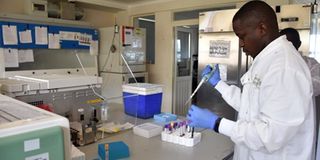Ugandan scientists launch clinical trials on HIV/Aids antibodies

What you need to know:
- The experts through collaborative efforts Under Uganda Virus Research institute (UVRI) and International Aids Vaccine Initiative (IAVI), a non-profit making organisation, among other partners, are undertaking the study codenamed C10.
Ugandan scientists are conducting two clinical trials to administer neutralising HIV/Aids antibodies (BrNAB) that can fight the virus.
The experts through collaborative efforts Under Uganda Virus Research institute (UVRI) and International Aids Vaccine Initiative (IAVI), a non-profit making organisation, among other partners, are undertaking the study codenamed C100.
The new study that was revealed last Friday at the celebrations held to mark 20 years since UVRI’s inception of its HIV Prevention Research Programme will focus on antibodies, which when injected in the body, are expected to neutralise the virus.
Mr Enoch Muyanja, the UVRI laboratory manager, says once the antibodies are administered into the body, the virus will not be able to multiply or enter the cells, leaving it to die.
The study is still in its early stages with a few trials having been made, according to Mr Muyanja.
Available measures
Apart from the common measures of prevention and controlling the spread of HIV/Aids, including abstinence, condom use, being faithful to one partner, there have been other measures such as PrEP (Pre-Exposure Prophylaxis), also called Oral Truvada, a medicine people take daily to prevent contracting the virus.
This, according to UVRI, should be emphasised, especially in adolescent girls and young women aged between 15 and 24 in whom the new HIV/Aids infections are occurring.The new PrEP injection
The previous PrEP has been effective, although many people do not fancy taking tablets every day.
Mr Muyanja says an injection (the long-acting injectable cabotegravir product), which has been under trial in Uganda and has already been rolled out in other countries, will solve the tablets challenge.With one injection, a person is protected from HIV/Aids for two to three months.
“The women are already recruited and they are in their late stages and we are following up on them, meaning towards the end of next year, we will be done with the study,” Mr Muyanja says.
Ms Brendah Okech, the director of Uganda Virus Research Institute, says unlike Covid-19 where a variant has to travel from one person to another, HIV/Aids is able to genetically modify itself into numerous variants in just one host, making it hard to track.“The hope we have is in these Broadly Neutralising Antibodies (BnAbs) that seem to be able to take care of many variants of HIV, ” Dr Okech says.
Muyanja says the PrEP trial has already been conducted in other countries and the injectable has been approved as a workable HIV prevention measure.
The injection is able to trigger the body into making antibodies to fight the virus.Prevalence
Even when the HIV/ Aids prevalence has since 2016 reduced from 6.2 to 5.4 percent, under the HIV Vaccine Programme, UVRI, in partnership with IAVI have been patching up other measures towards the zero transmission of the virus by 2030.
According to statistics by IAVI, with 38 million people living with HIV/Aids and 1.5 million people acquiring the virus in 2020, about $29 billion is needed for global HIV/Aids response by 2025.




